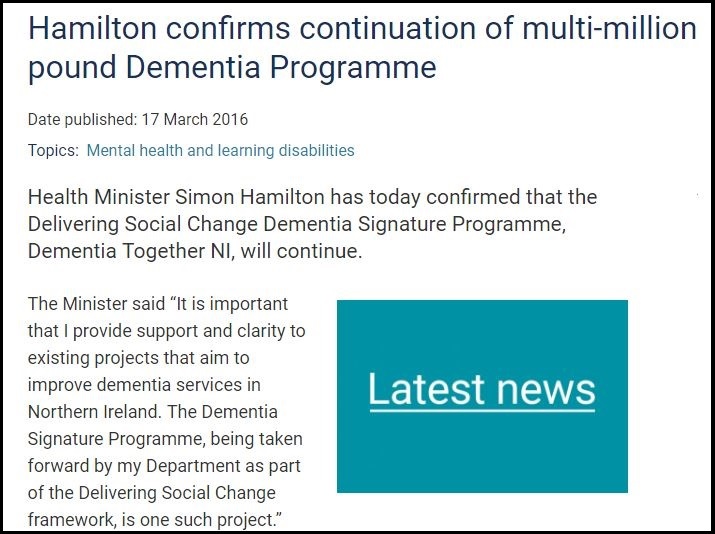RELATIVES whose loved ones are living with dementia have appealed to Stormont’s health officials to continue to fund innovative projects they say have improved their lives.
As The Detail previously revealed, around £1 million of a £6.25 million funding package originally earmarked for dementia care will not be spent at the end of the three-year project.
However, despite this, officials still plan to wind down a body set up in 2014 to implement the key aims of Northern Ireland’s first dementia strategy.
In a further development The Detail can also reveal that government is expected to return a portion of the funding given to Stormont by a philanthropic organisation to support dementia care in Northern Ireland.
Alzheimer’s Society spokesperson Barry Smyth said: “We strongly urge the Department of Health and the Executive [Office] to reconsider and to commit money originally allocated to dementia."
Dementia Together NI was established by government to deliver its dementia programme. It was tasked with raising awareness of dementia; improving access to information for people with the illness; delivering training to health professionals, and supporting carers.
The Department of Health confirmed Dementia Together NI, which was meant to finish this year, will be abolished in March.
A spokesperson told The Detail the overall project was “time limited” however those working with people who have dementia say they hoped the work would continue.
The Detail asked the department why the £1 million under-spend could not be used to continue to fund dementia services.
The spokesperson said the under-spend was due to savings, as well as projects coming in at a lower cost than expected. They added: “The unallocated monies from the Department of Health and The Executive Office will be used on other departmental priorities.”
The Department of Health confirmed this refers to the funding being spent on services other than dementia.
Meanwhile, documents obtained by The Detail also suggest that officials planned to see that dementia projects developed as a result of the philanthropic investment would be funded into the future by the Health and Social Care Board.
Now leading dementia charities have urged government to use the philanthropic funding in full and sustain dementia services into the future.
Barry Smyth, operations manager for the Alzheimer’s Society in Northern Ireland, has also called for a full evaluation of the 2011 dementia strategy.
He said there is severe under-investment in dementia compared to other serious health conditions such as cancer and heart disease.
He added: “We strongly urge the Department of Health and the Executive [Office] to reconsider and to commit money originally allocated to dementia to be invested in a strategic way that benefits those affected by the condition now and in the future.
“The fact that Dementia Together NI is drawing to a close must not allow the focus on dementia to drift. The 20,000 people in Northern Ireland living with dementia have the right to diagnosis, support and information wherever they live.”
It has also emerged that Stormont officials expect to return some of the funds donated to the project by philanthropic organisation Atlantic Philanthropies although the exact amount will not be known until the end of the financial year.
Atlantic Philanthropies is a US-based organisation which has donated money to support public interest projects around the world, including extensive investment in healthcare.
It committed to make up 40 per cent – or around £22.5 million - of the total £58 million invested into Stormont’s Delivering Social Change programme which was also financed by government funding and allocated £6.25 million to dementia policies.
Dementia is an umbrella term to describe a range of symptoms, including memory loss, confusion, and difficulties with speech and understanding.
Tara Collins is a programme manager with Dementia NI which supports people with the illness. She said: “Our members feel to date that the work done has only scratched the surface and there are still many gaps that need to be addressed. We are thankful for this project and will be disappointed when it comes to an end.
“We also wonder why all the money that was originally planned to be invested into dementia services through this project is not being spent on dementia.
“Why is this £1 million under-spend going towards other services when it was meant to be spent on dementia? It’s disappointing this money is not being used to extend the life of the dementia programme.”
In May last year, former Health Minister Simon Hamilton announced that “Dementia Together NI will continue” however a Department of Health spokesperson told The Detail the purpose of this press release was to confirm funding had been made available in that financial year.
As we previously reported, officials had failed to spend more than half of the £6.25 million Delivering Social Change dementia fund by May this year and now only expect the total investment to be around £5 million.
Meanwhile, The Detail has seen an internal briefing presented to former Health Minister Edwin Poots in 2014 - when the investment was announced - which appeared to suggest ongoing projects would be funded by the Health and Social Care Board after the Delivering Social Change dementia programme ends.
The document, obtained by The Detail under Freedom of Information legislation, said: "Subject to respective approvals, funding will be made available from Delivering Social Change/Atlantic Philanthropies for three years from this month.
“The Health and Social Care Board (HSCB) will be the sole funder for any activity linked to the projects extending into and beyond 2017.”
When asked about this, a spokesperson for the HSCB said: “The Health and Social Care Board and Public Health Agency are currently in discussions with the Department of Health regarding legacy planning in anticipation of the close of the Dementia Together NI Project on March 31, 2018.
“While the financial position will continue to be challenging, the health and social care system remains committed to improving regional dementia services and continuing to implement the service developments initiated through the Dementia Together NI initiative.”

An extract of the internal briefing on dementia presented to former Health Minister Edwin Poots in 2014.
In relation to the end of the overall dementia project, a Department of Health spokesperson said: “The dementia project was time limited. However, legacy arrangements will ensure that products developed by the project will continue to provide support and effective care to people with a dementia, their carers and families.
“The project has by any standard been a huge success and its legacy will continue to: tackle the stigma associated with dementia and promote better public awareness; provide accurate, up-to-date information and support for people with dementia and their carers, and ensure that services will be delivered by informed and competent staff.”
Dementia is a progressive illness caused by diseases in the brain and has been described as one of the biggest challenges facing society today due to an ageing population.
There are more than 20,000 people estimated to be living with the condition in Northern Ireland, although around 13,000 have received a formal diagnosis.
IMPORTANCE OF CARERS
One scheme delivered under the multi-million pound dementia programme was a four to six week training course for unpaid carers of people living with dementia.
It was funded from a £6.25 million funding package originally earmarked for dementia care under Stormont’s Delivering Social Change programme but will finish in December - 19 months after it was launched in May 2016.
The Department of Health said the carers’ scheme was a pilot and will now be evaluated “to inform future decisions about the design and delivery of informal carers' training programmes”.
However dementia charities and relatives of people with the illness say they are disappointed the project will not continue.
Out of 3,000 unpaid carers offered the training across Northern Ireland, 1,885 completed the free course which helped improve their understanding of dementia, as well as offering them advice and support on legal and financial issues, personal care of their loved ones, coping with stress and signposting to available services.
Click here to read how the informal carers’ training programme helped two families living with dementia.
The training was delivered by the Alzheimer’s Society and 3fivetwo Training Academy at a total cost of £577,000.
The Alzheimer’s Society told The Detail it had hoped the unpaid carers’ programme would be extended by up to three years at least.
Barry Smyth, the charity’s operations manager in Northern Ireland, said: “Unpaid carers are the backbone of our health and social care system, and it is vital that they are supported to provide the best care possible, while also looking after their own health and wellbeing.
“Regrettably, we are one of many organisations dealing with the consequences of no current Northern Ireland executive to make the vital decisions needed.”
Kelly Barbour is the dementia support co-ordinator for 3fivetwo Training Academy which delivered the carers’ course in the South Eastern Health and Social Care Trust area.
She said their courses began in September of last year and that the referral rate to the service was initially low. She hopes around 540 people will have been trained by the end of December which is 75 per cent of the 720 target it was set.
Ms Barbour added: “The original agreement was that all the referrals would originate from the trust and in reality that didn’t happen. We quickly realised that we were going to have to be proactive and we couldn’t rely solely on referrals coming from the trust, so we had to promote the project at a grassroots level. That’s how it was established.
“I think there will now be a huge gap in terms of what support is available for carers. We do an evaluation with people who’ve taken the course and, six months down the line, many are still in touch with people they met on it. Some even provide support and respite for each other because they live in the same area.”
The South Eastern Health and Social Care Trust told The Detail it advertised the programme on social media and to email contacts. Posters were also printed giving details of upcoming courses.
The Alzheimer’s Society delivered the training in the remaining four trust areas.
It previously offered a different carers’ information programme which is only run twice a year in some areas and is presented to a much larger group of people. The new course allowed more opportunity for people to ask personal questions and receive peer support.
All five trusts told The Detail they will continue to work with the Alzheimer’s Society to support carers in their area.
However, it is understood this could mean the charity will deliver its older carers’ training programme and not the new scheme which was developed as a result of the dementia strategy.
- For more information about support available to people living with dementia in Northern Ireland, please contact Dementia NI on 028 90686 768, visit the website www.dementiani.org or email [email protected].
- To learn about support available for anyone affected by dementia, contact the Alzheimer’s Society’s National Dementia Helpline on 0300 222 112.
- Alternatively, visit www.alzheimers.org.uk and Talking Point www.alzheimers.org.uk/talkingpoint which is an online forum accessible 24 hours a day.
The Detail’s funders include Atlantic Philanthropies.
 By
By


